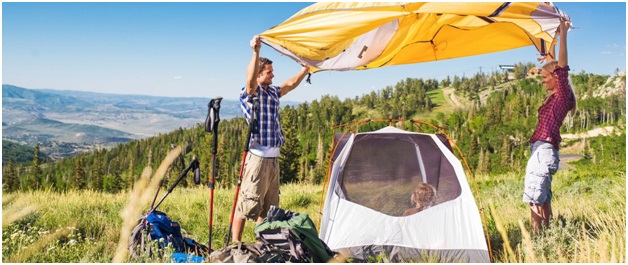Camping in New Zealand wasn’t always done as a leisure activity during the summer holidays. While it conjures up images of long and lazy days in the golden sun, camping Kiwi-style used to be done out of necessity or when there was work to be completed. A family holiday was the last thing on the minds of most of our early-day campers.
Seasonal camps were established by Māori as they gathered shellfish or went hunting. Work camps were constructed for gold miners and road builders, while camps were also set up for foreign soldiers and homeless people during times of depression. There certainly wasn’t much fun attached to the early days of New Zealand camping!
The origins of the modern campground that we’re more familiar with can be traced back to the 1920s. That’s when the New Zealand Automobile Association worked with local boards throughout the country to set up campgrounds for people who had moved on from travelling on horse-drawn carriages and were now getting about in cars. These people, enjoying their new found mobility, began to take their families further afield during their holidays, and often they’d stay in a place built especially for them – motor camps.
We can be forgiven for thinking the great Kiwi camping holiday is a bit of a relic of the past. As international travel has become more affordable, you might assume that we’ve spread our wings and changed the way we spend vacation time with our family. But sales of camping gear in New Zealand continue to increase, and this explains some recent statistics contained within a study carried out by the University of Otago.
The data in the study showed there were 313 campgrounds in New Zealand the 1930s, 416 in the 1970s and 876 in the 2010s. The most recent figures show that Blenheim, with 18 campgrounds, has more than any other town in the country, while traditional camping hot-spots like Northland and the Coromandel also have more than most. But for all that, campgrounds are evenly distributed throughout the country.
Of course, the closure of our borders during the COVID-19 pandemic will dramatically restrict the number of overseas travellers who camp out during their New Zealand holiday experience. Many of them, particularly the younger travellers, prefer to freedom camp. In the current climate, it is Kiwis who will be doing most of the freedom camping but only in areas where the local council will allow them to do so. Many councils will allow freedom camping only if the vehicle is self-contained i.e. it has a toilet, fresh water storage, waste water storage and a rubbish bin with a lid. Plus, every council has different rules e.g. some ban freedom camping within a certain distance of a town, or limit the stay to one night.
With freedom camping rules being so different all over the country, it’s safe to assume that many Kiwis will play it safe and opt for a form of camping that complies with every council bylaw. They’ll go to an outdoor store like this one, invest in a good quality family tent, and camp out in the traditional way. By doing so, the sun will never set on the golden days of Kiwi camping.

